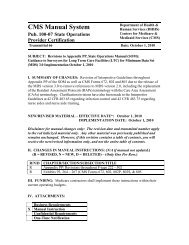LOUISIANA Community Mental Health Services Block Grant ...
LOUISIANA Community Mental Health Services Block Grant ...
LOUISIANA Community Mental Health Services Block Grant ...
You also want an ePaper? Increase the reach of your titles
YUMPU automatically turns print PDFs into web optimized ePapers that Google loves.
In the fall of 2008, upon receiving the Presidential disaster declaration for Hurricane Gustav, OMH<br />
conducted a needs assessment to determine the level of distress being experienced by disaster<br />
survivors and determined that existing State and local resources could not meet these needs. Fiftythree<br />
parishes were declared disaster areas for Gustav; they were awarded in four separate<br />
declarations as the State appealed the decisions. Louisiana immediately applied for a Crisis<br />
Counseling grant for Gustav while in the process of phasing down the Katrina and Rita grants. The<br />
grant was awarded in late September of 2008. Disaster mental health interventions include outreach<br />
and education for disaster survivors, their families, local government, rescuers, disaster service<br />
workers, business owners, religious groups and other special populations. CCPs are primarily<br />
geared toward assisting individuals in coping with the extraordinary distress caused by the disaster<br />
and connecting them to existing community resources.<br />
The CCP did not provide long term, formal mental health services such as medications, office-based<br />
therapy, diagnostic and assessment services, psychiatric treatment, substance abuse treatment or<br />
case management; survivors were referred to other entities for these services. CCPs provided shortterm<br />
interventions with individuals and groups experiencing psychological reactions to a major<br />
disaster and its aftermath. In this model, community outreach is the primary method of delivering<br />
crisis counseling services and it consists primarily of face-to-face contact with survivors in their<br />
natural environments in order to provide disaster-related crisis counseling services. Crisis<br />
counseling services include: Information/Education Dissemination, Psychological First Aid,<br />
Crisis/Trauma Counseling, Grief & Loss Counseling, Supportive Counseling, Resiliency Support,<br />
Psychosocial Education, and <strong>Community</strong> Level Education & Training.<br />
The Louisiana Spirit Hurricane Recovery program operated under the Gustav grants (DR-1786-LA<br />
ISP and DR-1786-LA RSP), from October 2008 through mid January 2010; the program employed<br />
a diverse workforce of up to 276 staff members. Management and oversight of the program was<br />
provided by a state-level executive team dedicated to the support of all operations of the project.<br />
Louisiana Spirit was designed to facilitate integration with other recovery initiatives, rather than<br />
compete with them. The Louisiana Spirit state-level organizational structure was designed to<br />
continuously be in contact with recovery initiatives throughout Louisiana and coordinate its<br />
activities with these other recovery operations. After Hurricane Gustav, there were fewer resources<br />
available to assist with hurricane related needs than were available after Hurricane Katrina in 2005.<br />
Each service area continuously strived to keep up with changing community resources to share with<br />
survivors and other community entities.<br />
The goal of Louisiana Spirit is to deliver services to survivors who are diverse in age, ethnicity, and<br />
needs. Extensive ongoing evaluation of the program included assessment of the services provided,<br />
the quality of the services provided, the extent of community engagement, and monitoring of the<br />
health and recovery of the entire population. The evaluation plan for Louisiana Spirit is<br />
multifaceted to reflect the ecological nature of the program seeking to promote recovery among<br />
individuals, communities, and the entire population of Louisiana. The assessment component of<br />
Louisiana Spirit strived to answer the question of the absolute number of people served and how the<br />
services were distributed across geographic areas, demographic groups, risk categories and time.<br />
To this end, each of the state-level administrative staff members was responsible for ensuring<br />
fidelity to the CCP model and expectations as directed by SAMHSA/ FEMA.<br />
PART C <strong>LOUISIANA</strong> FY 2011 PAGE 98<br />
SECTION III: ADULT PLAN – CRITERION 1<br />
COMPREHENSIVE COMMUNITY-BASED MENTAL HEALTH SERVICES -- SYSTEM OF CARE & AVAILABLE SERVICES
















